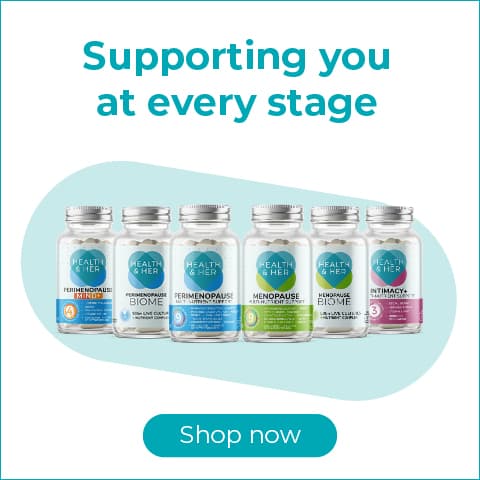The topic of Menopause will now be added to secondary school sex and relationship lessons in the UK curriculum. Education secretary Damian Hinds agreed that menopause is an important part of reproductive health, and that all children should learn about this subject at school. The news also raises the question – how can we best educate our own children about the changes that happen at this difficult time? We asked menopause coach, author and advocate Ruth Devlin to provide her typically frank and straight-talking guidance on the subject…
Suffering from perimenopausal symptoms, or wherever you find yourself within that hormonal transition through menopause to post menopause can, for some, be hard enough. Combine that with hectic family life and equally hormonal teenagers and life can be a challenge… even more so when trying to explain how you feel!
Having a conversation about the ins and outs of your mother’s hot flushes, night sweats and joint aches will, for most, result in a nano second of attention span, sheer indifference, or worse still, complete disinterest. Accompanied by the obligatory rolling of eyes! No matter how much they love you most children of any age assume you’ll always function as normal. Having parents who show any sign of ill health, irrational behaviour, or anything out of the norm is frankly a hassle and ends up being a bit of an inconvenience for them!
Why is it so important to try and have those conversations…
Well, it’s an absolute no brainer to educate everyone from as early an age as possible to not only help prepare them for their own potentially turbulent, hormonal journey ahead, but also help the family unit as a whole to understand what could be going on with a menopausal mum or a hormonally challenged sister or brother!
Simplifying the role everyone’s hormones play can be a challenge though and let’s face it, potentially a bit of a dry topic!
How on earth do you start that conversation…
Nuggets of information dropped into conversation can be more beneficial than sitting down with a full on power point presentation filled with infographics, references and notes to take away! Always remember repetition is essential – ever realised it’s not just us menopausal women who suffer from memory loss…or is that selective hearing?!
A good starting point can be pointing out we have oestrogen receptors all over our bodies – hence the multitude of different symptoms potentially to be faced. Try and pop the odd comment into every day chat with comparisons to symptoms their own hormones might be subjecting them to and from experience a bit of humour goes a long way… okay, a lot of humour.
How about hair as a topic? It can be an easier starting point than the menstrual cycle! On recently parking at our local supermarket another car zoomed in next to me driven by a lady of similar age… on arrival this lady promptly whisked out a set of tweezers, but instead of tweaking the shape of her eyebrows she started plucking the odd hair out of her chin! So, a short humorous chat about the redistribution of hair caused by the contribution of hormones can be much more amusing for teenagers to listen to than the
endless moaning about having to dye your frizzy, greying hair! Everyone remembers having an aged aunt or granny who was a little heavy handed with the old powder puff that resulted in enhancing the extra downey facial hair that can develop for some at this time of life…no? Oh well, maybe that was just my aunt then!
Sons can be incredibly hard at this age to talk to about anything, let alone your perimenopausal symptoms. I’m not suggesting you’re going to start talking vaginal dryness to your already mortified, monosyllabic, grunting son, but drawing attention to the extra nasal and ear hair that some men develop can help explain how bodies change and evolve with fluctuating hormones. Especially when your son might be one of those desperate to develop real stubble rather than the odd bit of fluff which
only requires them to shave once a week! A very frustrating time!
Spots… those frustrating, random eruptions of horror which for any teenager can feel like they have Mount Vesuvius on their face, even if it’s the tiniest dot! But they can also be a good time to try and start the conversation about healthy diets, lifestyle choices, and how what you put into your body can really help skin conditions. You could also drop in that maybe you’ve started to have the odd eruption yourself now and again due to the perimenopause and why that is. You can also discuss how exercising and making sure you’re hydrated (water not fizzy drinks though) will help all sorts of teenage ailments which can be contributed to by hormones.
It doesn’t matter if you are 16 or 46, hormones are not selective.
Take the seemingly bizarre synchronisation of any female menstrual cycle within a household… why is that?! Let’s just say at certain times of the month tensions would run high in our household before my daughter and I addressed our hormone imbalances! A sense of relative calm now being appreciated by the other male members, relative being the operative word! It’s not just humans either. A friend recently commented her three Italian Spinone dogs were all synchronised too! What a household to live in… we are talking three human and three canine hormonally, fluctuating females! Yes, of course, I sent her husband a copy of mybook, have you seen the size of spinone dogs! Take any in-roads into a conversation about periods that you can, even if it’s through your dog being in season!
Throwing in the odd comment that yours have either stopped or become intermittent – doesn’t need to be in huge detail, just sewing a seed of information which they will remember at a later date and if you’re lucky the odd one will ask more on the topic… well you never know!
Aching joints – now there’s a topic, but how many teenagers complain about their own joint aches – commonly called growing pains? If they do, it’s an ideal time to pop into conversation why you bang on constantly about the benefits of having smoothies packed with nutrients and antioxidants. Why you try to serve up fish at least once a week if not twice (realise for some teenagers that’s a step too far!). The benefits of hydrating with water rather than caffeinated power drinks after a workout…it doesn’t have to be like a nutritional lecture every time you talk but even if you manage to get them to remember one tiny morsel of information you’re doing well! It also helps to explain why you’re doing lots of exercise to help keep your joints lubricated. Do try and pop in to conversation that peak bone mineral density (BMD) is reached between the ages of 25 and 30 years – I always found with my kids that got them thinking a little bit more about what they were eating. The conversation can then naturally drift through to the possible consequences of long term oestrogen deficiency for some: osteoporosis. Pop in the benefits of Vitamin D especially living in the UK with our limited exposure to sunshine!
Trying to explain the debilitating effects that some of the psychological symptoms you might be experiencing can be more of a challenge…but again, so many parallels in this area with low mood swings, irritability, (think slamming doors of teenage daughters!) and the increasing levels of stress and anxiety, amongst teenagers. Try to get your daughter to go along to yoga or pilates with you – explain the benefits of positive mindfulness and cognitive behavioural therapy (CBT) which you are by now practising daily…if not why not?!
Informing and chatting to your children and partners about how you feel and then trying to get relevant information across can most definitely be a challenge and I’m not suggesting you will manage this overnight. Teenagers have a great capacity for learning, you just have to find the right route in! It is worth persevering, help to put things in perspective and make them realise their mother isn’t actually going bonkers after all.
Do’s and dont’s:
- Do get informed yourself, the more knowledge you have the better you will cope with your symptoms and the easier it will be to explain things to your kids
- Do have open conversations and drop those nuggets of information in at will
- Do make comparisons to symptoms they are suffering from
- Do encourage kids to take responsibility for their own health through lifestyle choices – they are in control of what they put in their mouths
- Do get support from the men in your life, here’s how to talk to men about menopause.
- Do buy a copy of my book ‘Men…Let’s Talk Menopause’ – useful not only for partners, but with it’s easy to read format and humour ideal for teenagers to dip in and out of as well
- Don’t rely on teachers and school nurses to provide education – they have a hard enough job as it is
- Don’t put up with your symptoms and try and hide them, it’s usually obvious there’s something going on, in the long run it helps you and everyone else if you chat and explain things
About Ruth Devlin
After experiencing an array of perimenopausal symptoms
herself and realising the lack of consistent information available at the time,
Registered Nurse Ruth Devlin decided things had to change. Teaming up with
like-minded women from healthcare backgrounds, she co-founded Let’s Talk
Menopause to raise awareness about the menopause, demystifying it and most
importantly, providing easy access to information and support. She is a member
of the British Menopause Society and has liaised with menopause specialists to
establish what women really want, and need, to know about the menopause. It’s
no surprise, then, that she has appeared on everything from Radio 4s Woman’s
Hour to the BBC Insider’s Guide to the Menopause documentary with Kirsty Wark.



